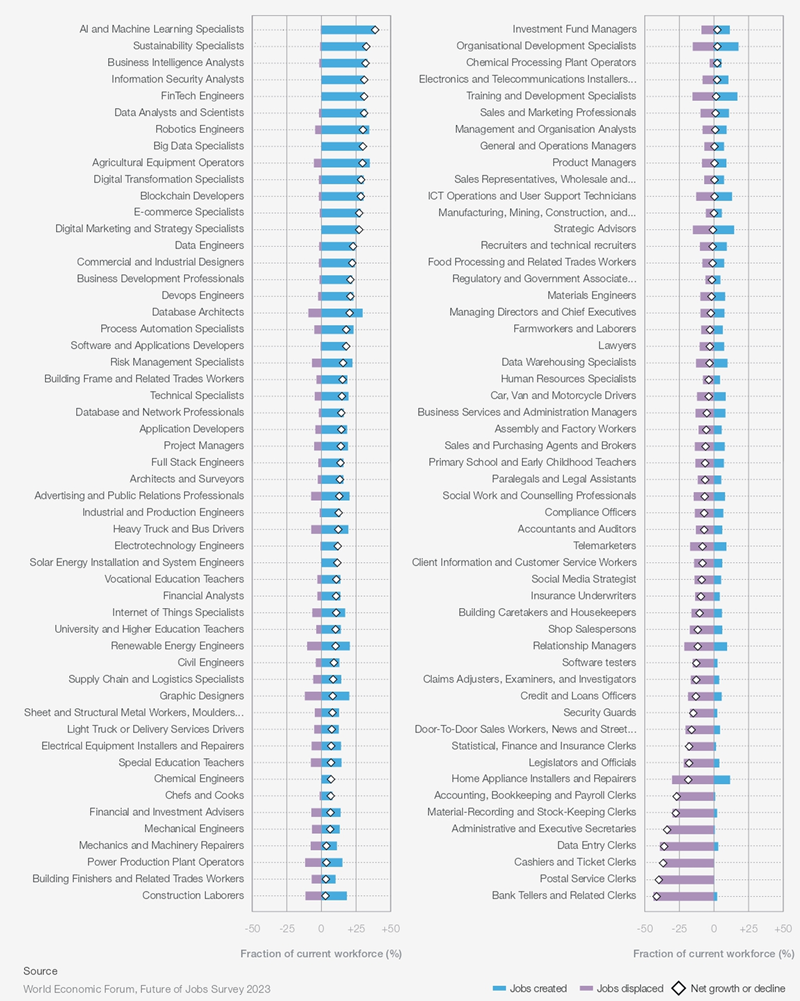For those facing the decision of which professional path to choose or to requalify, analyzing trends in technological development and the digital revolution is crucial. According to detailed research and the “Future of Jobs” report by the World Economic Forum published in May 2023, there are assumptions about the sought-after occupations and competencies in the next 5 years. According to this research, 69 million jobs will be created thanks to technological advancement, AI, and the growing emphasis on the ESG (Environmental, Social, Governance) concept of sustainable business.
I believe some of the readers, including my favorite forum members, might now think: “Here comes Suzana with a crystal ball to predict our fate.” I’ll have to disappoint them because I haven’t acquired the crystal ball yet, but I have delved into the study of the truly impressive World Economic Forum report, which encompasses 296 pages. In collaboration with companies like LinkedIn, Indeed, and Coursera, as well as over 25 different economic organizations worldwide, the World Economic Forum created this report.
As the need for new skills evolves, companies devise and expand their training programs. In the Future of Jobs report published for 2020, companies estimated that 42% of workers had completed training that bridged skill gaps. This share slightly decreased to 41% in 2023. Considering this, entrepreneurs believe that the skills gap in the local workforce is the main obstacle to achieving industry transformations, and they see salvation in investing in workforce learning and training. They consider this the most promising strategy for achieving their business goals. The emphasis is on formulating effective reskilling, as well as introducing upskilling strategies for the next five years to maximize business success.

Over the next five years, it is predicted that 83 million jobs will be lost and 69 million jobs created, representing a structural change in the labor market of 152 million jobs, or 23% of the 673 million employed in the dataset studied. This represents a decrease in employment of 14 million jobs or 2%.
Likewise, it is predicted that, of all the skills currently needed in the labor market, only 56% will continue to be in demand. The remaining 44% will become obsolete.
WHAT ARE THE JOBS OF THE FUTURE?
The attached graph from the World Economic Forum shows in blue the areas of employment that will grow, and in purple the jobs that will be lost over time.
Here mentioned are around a hundred different jobs, so I selected about thirty to analyze.
And according to Associate Professor Živa Veingerl Čič, a professor at the Slovenian DOBA Faculty, experts in artificial intelligence who will be engaged in forming and maintaining advanced algorithms for process optimization will become increasingly sought after. With the increasing use of artificial intelligence, ethical oversight will become not only a desirable but also a necessary aspect in the development and application of technological solutions. Therefore, there will be a need for a greater number of a new generation of experts called ethical advisors, whose role will be to ensure that algorithms are shaped and programmed in a way that prevents discrimination and data abuse. It is also predicted the position of ethical procurement managers who will be responsible for ensuring that all procurement sources follow ethical standards and must ensure that all production takes place ethically, respecting high ethical standards.
Digital skills will become crucial, with significant growth expected in various industrial sectors related to data analysis, cloud computing, and cybersecurity. Internet of Things (IoT) engineers will be crucial for connecting infrastructure to optimize the functionality of cities, industries, and other environments.
Similarly, there is an expected increase in the demand for blockchain specialists responsible for developing, managing, and maintaining blockchain technology used to ensure security, transparency, and decentralization in various sectors such as finance and logistics.
With the increasing frequency and complexity of cyber threats, cybersecurity experts will be highly sought after to protect sensitive data and critical infrastructure. As remote work becomes more prevalent, there will be a need for remote work and virtual collaboration specialists who will specialize in virtual collaboration tools, remote team management, and digital communication.
With the continued growth of e-commerce and digital advertising, jobs in e-commerce and digital marketing will continue to expand. E-commerce is already a common business model, but with so many e-commerce businesses competing in the market, special methods of standing out and surfacing will be necessary to attract customers.
Data analysts and data scientists – the ability to collect, analyze, and interpret large amounts of data is becoming increasingly important in all industries. Jobs in data analytics and data science are expected to be highly sought after. Robotics and automation – as automation technologies continue to advance, new job opportunities will arise in fields such as robotics engineering, automation design, and maintenance.
In a world where we can immerse ourselves in virtual reality with VR glasses, new horizons are opening up for designers and programmers. VR experts will increasingly revolutionize the way we experience the digital space by developing more and more interesting applications and technologies. Their work will not only be entertaining but also educational, creating virtual museums and therapeutic spaces.
Augmented reality developers will develop applications and technologies that bridge the real world with the virtual.
Digital influencers are individuals who create online content. They are already popular but will become even more so in the future, on all social media platforms, especially on Instagram. Since brands know that people want to connect more and more with real individuals to remain loyal to a brand, brands are increasingly hiring them for personal promotion.
Online teachers, coaches, or mentors will become increasingly popular as there will be a demand for professionals who can help other people progress in various areas of their lives, especially in their professional careers, in the simplest way possible.
IT brokers will mediate between IT service providers and their customers. They should be able to understand customer requirements and find suitable suppliers who will be able to meet their demands and needs.
Renewable energy engineers will be involved in developing new processes and improving existing ones to produce energy from renewable sources such as wind, solar, and water.
Eco-builders will increasingly create and use environmentally friendly materials and modern methods in construction, while environmental engineers will focus on planning and implementing environmentally friendly and sustainable projects, with a special emphasis on developing systems that minimize the negative impact of industry on the environment.
Urban farmers will focus on crops in urban environments using innovative techniques, while sustainable development experts will focus on transforming business models and practices towards greater sustainability.
Architects and engineers of smart cities and homes will continue to design and build smart, energy-efficient, environmentally friendly, and technologically advanced cities and homes.
Digital transformation specialists will be involved in transforming traditional business models into digitized, efficient systems that use technology to improve business and services.
In addition to technological occupations, occupations that empower mental health and well-being are becoming increasingly important. Among existing occupations, specific occupations are developing, such as mental health therapists, who help people cope with the stress of modern life, and digital well-being psychologists, who help individuals manage the impact of digital technology on their mental health. Also, becoming increasingly popular are chief happiness officers who will be responsible at a strategic level for ensuring that the work environment is stimulating and positive, that employees can grow and develop in it, and that their experience is positive. They will be key drivers in creating and maintaining a positive organizational culture in every organization or work environment.
Telemedicine specialists will be crucial for future healthcare systems. During the pandemic, we all saw the importance of telemedicine. Doctors and medical professionals who educate and adapt to digital service environments will be in higher demand than others.
Digital rehabilitation advisors will help people who have had accidents or illnesses to regain their health and self-confidence as quickly as possible through digital tools and advice.
Cognitive neuroscientists and neuromarketers will be important for understanding how the human brain works and how to use that knowledge in marketing. They will be able to use their insights to develop more effective marketing strategies and create products and services that better meet consumer needs.
Social media moderators and digital detox counselors will help people reduce their use of digital media and develop healthier habits in their use of technology.
The profession of virtual event planner will become increasingly important as more and more events take place online. Virtual event planners will be responsible for organizing and managing online conferences, trade shows, and other virtual events.
Genetic consultants will help people understand their genetic makeup and make informed decisions about their health, lifestyle, and medical care.
In addition to the professions I mentioned, there are many other professions that will be sought after in the future, so it is up to us how we want to choose and adapt to the new situation.
ARE THE JOBS OF THE FUTURE FULLY UNDERSTOOD?
As we look to the future, the labor market is undergoing rapid transformation due to advances in technology, changing demographics, and evolving consumer preferences. However, it is important to recognize that predicting the exact jobs of the future is challenging. While we can identify trends and make educated guesses about which industries and occupations will grow, there are many factors that can influence the job market, including economic conditions, government policies, and social changes. Therefore, while it is useful to consider the skills and occupations that are likely to be in demand in the future, it is also important for individuals to be adaptable and open to learning new skills throughout their careers. By staying flexible and continuously updating their skills, workers can position themselves to succeed in a rapidly changing job market.
